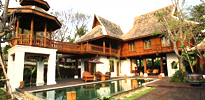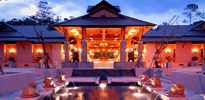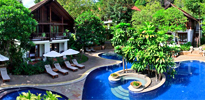Thailand Buddhism
Buddhism is the primary religion in Thailand with more than 90% of the population being Buddhist. Practiced Buddhism in Thailand, Theravada, is quite different from what is tentatively understood in western conception.
The belief adopts the law of “Karma”, which is based on the idea that one’s life is not confined in the birth and death but is a continuous chain of incarnation. The entire bad and good things one do in the current life will decide their fate in the next. Generally, it emphasizes on the purest and most beautiful affection of human beings: tolerance, love and compassion. Therefore, it enjoys immense popularity in Thailand from its introduction.
Religion in Thailand encompasses many aspects of Thai life. Tall golden stupas (a mound-like or semi-hemispherical structure containing Buddhist relics) might be the first image to come in one’s mind when thinking of Thailand. It becomes more than a symbol of Buddhist architect. Whether travelling through lush green countryside or exploring small back lanes in Bangkok, a temple always dots the scenery. Temples are also the gathering places for local community to pray and receive blessings the monks.
Statues of Buddha are worshipped by people everywhere. In schools, buses, stores, and especially in office buildings, there are always Buddhist altars, though simple but highly solemn. Any Thailaymen hope to go into a monastery thereonce in their life several days, weeks or even years. Civil servants of the government and the king are also expected to do the same. The current monarch, King Bhumibol Adulyadejwent to temple in two weeks of 1956. This retreat is expected of all male Thai, rich or poor, and often is scheduled after high school. Such retreat brings honor to the family and meritto the young man. Thai make allowances for men who follow this practice, such as holding open a job.
Peopledonot consider the Buddha as a God but rather as a real person who reached enlightenment through meditation and leading a good life. They pray or accord great respect to his imageas a way to promise him to have a peaceful and long-lived life, discharging all sins and conflicts of the society.
To sum, Buddhism nowadays becomes a holy treasure and a source of happiness of Thais. They do not come to this religion as extremely loyal followers but hope to find peace of mind and beautiful lifestyle devoted by Buddhism.
You might also read...

Muslim is the second largest religion of the country, making up 4 percent more or less of all Thai practitioners. The religion is mainly practiced in the South, where the majority of Malaysian...

The Portuguese and Spanish first introduced Christianity into Siam in 16th and 17th centuries. These evangelists gained very modest achievements in persuading Thais to follow this religion....

According to the Thai Census of 2005, there are 52,631 Hindus living in Thailand, making up just 0.09% of the total population. They mainly reside in large cities, most prominently in Bangkok.

The Sikhs are also concentrated mainly in Bangkok, which is the truly center of Sikh immigrants. Divided into two religious sects, they worship at two different temples.

Judaism is probably the religion with smallest population in Thailand. The first imprint of Jewish practitioners in the kingdom can be traced back from the 1800s; most of them came as merchants...

















































































